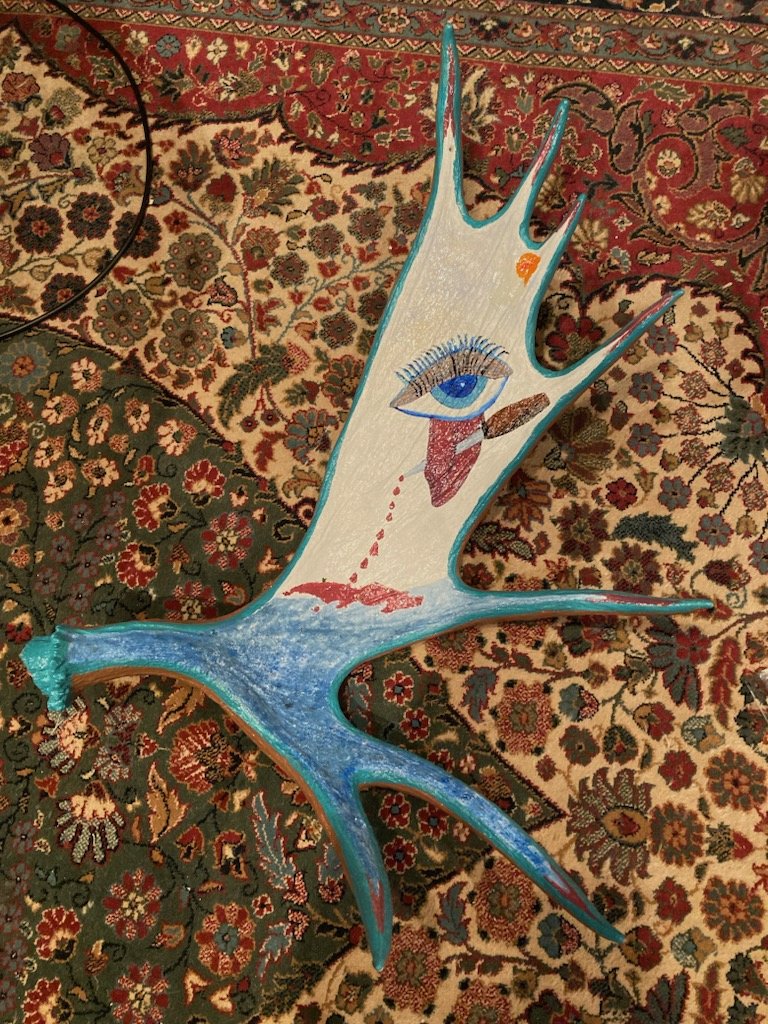Remittance (2022)
(Oil on Moose Antler)
Cory W. Thorne
Remittance
Remittance is an exploration of transculturation in Cuban and Newfoundland and Labrador folklore while drawing attention to the deep historical relationships and responsibilities that are hidden and ignored in everyday life. Cuban folklorist Fernando Ortiz coined the term “transculturation” to describe the ways in which Spanish colonialism resulted in new and unique cultural productions in Cuba; not a mere loss or transition of identities, but rather how African and European elements merged into something new (1940). The third eye with a tongue and a machete is a common image in Cuban folk art that is often painted on the exterior of houses as a form of protection, and it stands as an example of this concept. Imposed onto a moose antler, a symbol of Newfoundland and Labrador folklore, belonging, and masculinity, it likewise speaks to cultural imaginaries of isolation and insularity that are often used to avoid acknowledgement or responsibility for Newfoundland and Labrador’s connections to the African slave trade, and for ongoing support of Global North/Global South inequalities.
Newfoundland foodways are an underexplored and deeply powerful example of transculturation. Newfoundland salt cod/Bacalao was an essential source of nutrition for many slave plantations, and it could not be produced without importing salt from these plantations. It is a product of this connection. Screech—the rum that has evolved into a ritual of belonging in Newfoundland—began on Dutch-run slave plantations in Guyana, and later, British-run plantations in Jamaica. Molasses, rum and fruit cake, date squares, and coconut snowballs all serve as unacknowledged reminders of Newfoundland’s deep connections with this history. Moose meat and the male-dominated ritual of moose hunting is likewise a product of movement and an example of transculturation. Though often assumed to be native to the island, moose were brought to the island in 1904 to spur economic development via big game hunting. They are unquestioned and deemed natural while promoting a narrative of insularity and innocence.
Dripping blood into Cuba, Remittance is about how survival in Cuba is dependent on tourism and relationships with the Global North. Remittances are not just about supporting friends and family who have been denied a pathway forward because of their place of birth. Remittance is about respecting my Newfoundland ancestry, remembering ancestors who might have been unwilling, conflicted, or unknowing participants in the networks that were essential for the North Atlantic slave trade. It is about reconciliation, responsibility, and healing. Remittance likewise reflects on my personal connections to Cuba, and the sadness that haunts me when I overhear naïve and xenophobic conversations among Global North tourists headed to and from southern resorts.
The COVID-19 pandemic was particularly disruptive to Cuba’s already struggling economy. Because of its proximity to the Varadero resorts, Matanzas was hit hard by the loss of tourism. Matanzas is likewise Cuba’s primary port for importing and storing fuel. On 5 August 2022, an explosion destroyed a fuel tank on the edge of the city. The fire spread to adjacent tanks and for the next five days the city was blanketed in black smoke and soot. In addition to the economic crisis, they now faced an environmental disaster, worsening shortages of food and water, and daily blackouts. This led to new waves of migration from Cuba through various parts of central America and Mexico, with the goal of settling in the United States.
I created Remittance while in COVID-19 isolation in Newfoundland, and while receiving updates from several different friends who were attempting to cross from Cuba to the United States via central America and Mexico. Gíorge Míchel Mílían Maura now resides in Miami, where he has already established himself as a mural artist in the Little Havana neighbourhood. The bulk of my research community now lives outside of Cuba, in various parts of the United States and Europe.
References
Ortiz, Fernando. (1940) 1995. Cuban Counterpoint: Tobacco and Sugar. Translated by Harriet de Onís. Durham: Duke University Press.

